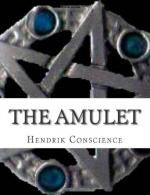“You speak of the banker Liefmans, do you not, father?”
“Yes, my child. He disappeared suddenly. A fortnight had passed in useless inquiry; his parents had the service for the dead offered for him, and he was found alive and well in a cellar, where some robbers had imprisoned him, in order by it to obtain a large sum of money.”
“And the same may happen, to Geronimo!” said Mary, with a confidence she did not feel, in order to aid her father in his kind intentions.
Signor Deodati shook his head incredulously.
Mary took his hand tenderly, and said, cheerfully:
“We must hope, signor. Perhaps the Lord in his mercy will grant that our fears may not be realized. Would we not for the remainder of our lives offer our grateful prayers to heaven?”
“Yes, yes; during our whole lives. And I would go in my old age to Our Lady of Loretto to express my boundless gratitude to the Madonna. But suppose he has fallen under the assassin’s sword?”
Mary shuddered at the thought, but she interrupted the old man.
“Signor, Geronimo possessed an amulet which had rested on the tomb of our Lord. He was convinced that it would preserve him from a violent death, and he always wore it around his neck.”
“I know the circumstances under which the amulet was given him,” replied Deodati. “I myself had some faith in this talisman, because it was the recompense of a good action; but we have no proof that the woman who gave it to Geronimo had any certain knowledge of its efficacy. However, Mary, we will still hope. Your sweet voice has mitigated my sorrow. May my poor nephew be restored to me. The happiness I expected in my old age may yet be a reality. You, Mary,—pure image of piety, goodness, and love,—you will be my child! And when old Deodati will be called to leave this world, he will see you and Geronimo by his dying bed, like two angels, pointing out to his expiring goal the path to heaven. Oh! no, no; this would be too much happiness. My mind wanders. And yet, Mary, let us hope!”
The young girl was deeply moved by the picture of that happiness which she had thought was lost to her forever. Her eyes were suffused with tears; her limbs trembled, and had not a stern look from her father reminded her of her duty, her oppressed heart would have found relief in sobs.
Mr. Van de Werve thought it better to change the conversation, and said to Deodati:
“Let us not forget, signor, that we are men, and that it becomes us to bear up courageously under a painful suspense, and in a manner to which a young girl might be unequal. Have you heard nothing since the morning? Have you not seen Signor Turchi?”
“I spoke to Signor Turchi about an hour before ’Change,” said the old gentleman, more calmly. “The good Turchi! he seemed even more dejected than we. Within the last five days, he has lost so much flesh that one would scarcely recognize him. He does not give himself a moment’s repose. From morning until night he is running about from place to place, seeking Geronimo as though he were a beloved brother.”




